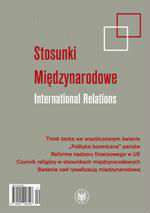Nowy regionalizm w Azji Wschodniej
New regionalism in Eastern Asia
Author(s): Bogusława Skulska Subject(s): Politics / Political Sciences
Published by: Wydawnictwa Uniwersytetu Warszawskiego
Keywords: new; regionalism; eastern asia; development; production; crisis; china; japan
Summary/Abstract: The research of new regionalism in Eastern Asia reveals that it is the experience of the Asian crisis of the period 1997-1998 and poor progress in the negotiations within the Doha Round that have become the stimuli for its development. They contributed to the creation of an efficient, mainly financial and currency, cooperation base, and at the same time they accelerated the removal of trade barriers through bilateral free trade and economic partnership agreements, which are concluded between countries at a different level of development. They also accelerated the establishment and sector-based relocation of international production networks, which facilitates lowering production costs by using the local comparative advantages of Asian countries, transfer and diffusion of technologies and knowledge among them, and at the same time increases their competitiveness in attracting direct foreign investments. New regionalism emphasises the cooperation between countries on the forum of the integration institutions which have been gradually established. Voluntary agreements between individual countries also play a significant role here and mutual trust is the basis for all cooperation. However, it is worth emphasising that in the region of Eastern Asia there is a conflict of influence of superpowers and groups of smaller states, which are afraid of the dominance of both China and Japan. Thus, it is highly probable that they will strive for the development of new regionalism around the ASEAN or EAS Community.
Journal: Stosunki Międzynarodowe
- Issue Year: 44/2011
- Issue No: 3-4
- Page Range: 93-115
- Page Count: 24
- Language: Polish

